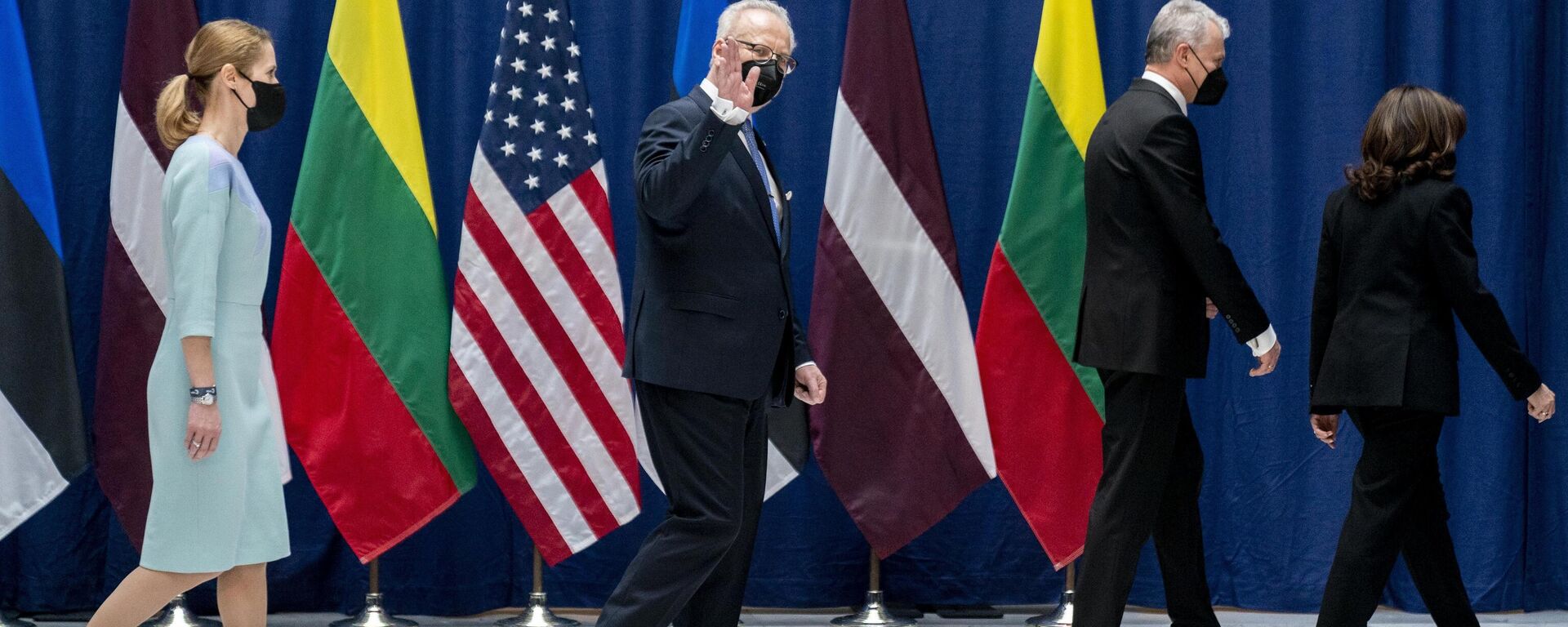https://sputnikglobe.com/20240219/how-eurobonds-to-arm-ukraine-may-strip-eu-members-of-sovereignty-1116880328.html
How Eurobonds to Arm Ukraine May Strip EU Members of Sovereignty
How Eurobonds to Arm Ukraine May Strip EU Members of Sovereignty
Estonian Prime Minister Kaja Kallas has proposed issuing €100 billion ($107.8 billion) in Eurobonds to boost Europe’s defense industries. Is the plan realistic, and what risks does it carry?
2024-02-19T18:16+0000
2024-02-19T18:16+0000
2024-02-19T18:16+0000
world
europe
tom luongo
viktor orban
ukraine
brussels
russia
european union (eu)
nato
federal reserve
https://cdn1.img.sputnikglobe.com/img/07e6/09/1d/1101328606_0:160:3073:1888_1920x0_80_0_0_fea75d98fe8624f1e1de153c02d08bb6.jpg
Kallas shared her plan to issue €100 billion ($107.8 billion) in Eurobonds with Bloomberg on February 18. The news site revealed that the idea of joint borrowing has already been backed by French President Emmanuel Macron and European Council President Charles Michel. According to Kallas, that would help the European Union to ramp up weapons production and send more arms to Ukraine.»Eurobonds are the Holy Grail for European integration,» Tom Luongo, financial and geopolitical analyst, told Sputnik. «PM Kallas is telling you what the plan is. The EU’s Achilles’ heel is the euro itself and its lack of central taxing authority.»»Eurobonds, issued through the European Commission, of this type are another way of handing that authority to Brussels, bypassing member state central banks and legislatures,» he added.Luongo explained that EU Commission must be given direct taxing authority to guarantee the bonds to investors. «Their SURE bonds, issued after COVID-19, were the first proof of this mechanism,» he said.»This saw the Commission become one of the world’s most significant environmental, social, and governance (ESG)-label issuers, with SURE social bonds accounting for 16 percent of global social bond issuance in 2021,» the European Commission’s website boasted.Luongo pointed out that this mechanism de-facto legitimizes the commission’s central authority «to guarantee to investors they can impose their will on EU members,» while keeping Ukraine on a financial lifeline to justify re-arming Europe. «This is why they were so angry with Viktor Orban over blocking Ukraine aid,» the expert noted.What are the Risks?»The risks are mostly political for the people of Europe,» Luongo said. «Because it means that if you think that things are out of control in Brussels now, just wait when you are paying taxes directly to the EU Commission. What you saw over the past month with Orban was a warning to the rest of the EU. There is no partnership here: there is only the exercise of raw power from the central authority.»It is no coincidence that PM Kaja Kallas of Estonia, a nation of just 1.3 million people, was chosen to float the EU leadership’s idea, according to the expert: «It’s meant to shame the rest of the EU to go along with this.»Will the Plan Fly?The plan is not unrealistic, according to the expert. In fact, it appears to be yet another step on the path chosen by Brussels to subjugate EU member states.»The incipient inflation and overly-strong euro as a currency is pushing their industries offshore as a result. But that is, again, part of the strategy. Because for every BASF plant built in the US, what comes with it are the strings of EU regulations which the local and federal governments must adopt. These are designed to collapse the competitive advantage of the foreign nation by raising their costs locally,» the financial analyst continued.According to Luongo, «the fly in this ointment» for Brussels is that they have to raise interest rates to keep pace with the Federal Reserve. «With each month that passes where the Fed refuses to back off on interest rates the more the risks to Brussels’ plans multiply», he said.Indeed, following the latest worse-than-expected Consumer Price Index (CPI) rate of inflation, the Federal Reserve made it clear that it was not the time to cut interest rates.Brussels is Shooting Itself in the FootHowever, the crux of the matter is that proposals aimed at centralizing power in the hands of unelected bureaucracy could lead to the collapse of the entire scheme, the expert argued.
https://sputnikglobe.com/20240219/eurobonds-floated-as-eu-grapples-with-ukraine-aid–depleted-weapons-stocks-1116873838.html
https://sputnikglobe.com/20240218/eu-lacks-funding-to-produce-ammunition-supply-for-ukraine—borrell-1116860631.html
https://sputnikglobe.com/20240206/eu-gets-ukraine-involved-in-preparing-european-defense-industry-plan-1116625599.html
https://sputnikglobe.com/20240214/too-early-for-victory-laps-bidenomics-failing-as-inflation-persists-1116784489.html
ukraine
brussels
russia
2024
News
en_EN
https://cdn1.img.sputnikglobe.com/img/07e6/09/1d/1101328606_170:0:2901:2048_1920x0_80_0_0_12ffc191dfb9e4094377ca88fe9f8a9b.jpg
eurobonds, eu joint borrowing to boost weapons production, estonian prime minister kaja kallas, issuing €100 billion in eurobonds, covid sure social bonds, brussels centralizes financial power in the bloc, nato, phantom threat from russia, war in ukraine
eurobonds, eu joint borrowing to boost weapons production, estonian prime minister kaja kallas, issuing €100 billion in eurobonds, covid sure social bonds, brussels centralizes financial power in the bloc, nato, phantom threat from russia, war in ukraine
Estonian Prime Minister Kaja Kallas has proposed issuing €100 billion ($107.8 billion) in Eurobonds to boost Europe’s defense industries. Is the plan realistic, and what risks does it carry?
Kallas shared her plan to issue €100 billion ($107.8 billion) in Eurobonds with Bloomberg on February 18.
The news site revealed that the idea of joint borrowing has already been backed by French President Emmanuel Macron and European Council President Charles Michel.
«Eurobonds are the Holy Grail for European integration,» Tom Luongo, financial and geopolitical analyst, told Sputnik. «PM Kallas is telling you what the plan is. The EU’s Achilles’ heel is the euro itself and its lack of central taxing authority.»
«Eurobonds, issued through the European Commission, of this type are another way of handing that authority to Brussels, bypassing member state central banks and legislatures,» he added.
«If one was cynical, which I am, one would suspect that the EU’s support for the war in Ukraine was mostly driven by this desire to centralize power in Brussels,» Luongo argued. «You start a war in Ukraine by purposefully crossing Russia’s red lines, drive inflation up locally, and empty the military coffers of all the post-WWII weapons and ammunition that is now outdated. (…) If you are losing, as you are now, you play up the threat of Russia not stopping at Ukraine to justify shifting your domestic spending to a military build-up, issuing Eurobonds to pay for it.»
Luongo explained that EU Commission must be given direct taxing authority to guarantee the bonds to investors. «Their SURE bonds, issued after COVID-19, were the first proof of this mechanism,» he said.
SURE was the bloc’s program to fund short-term employment schemes across the EU and keep people in jobs during the COVID-19 pandemic. All SURE funds were raised through back-to-back issuance of social bonds, with the total funding amounting to €98.4 billion ($105.95 billion). The last bond was issued by the EU on December 7, 2022.
«This saw the Commission become one of the world’s most significant environmental, social, and governance (ESG)-label issuers, with SURE social bonds accounting for 16 percent of global social bond issuance in 2021,» the European Commission’s website boasted.
Luongo pointed out that this mechanism de-facto legitimizes the commission’s central authority «to guarantee to investors they can impose their will on EU members,» while keeping Ukraine on a financial lifeline to justify re-arming Europe. «This is why they were so angry with Viktor Orban over blocking Ukraine aid,» the expert noted.
«The risks are mostly political for the people of Europe,» Luongo said. «Because it means that if you think that things are out of control in Brussels now, just wait when you are paying taxes directly to the EU Commission. What you saw over the past month with Orban was a warning to the rest of the EU. There is no partnership here: there is only the exercise of raw power from the central authority.»
It is no coincidence that PM Kaja Kallas of Estonia, a nation of just 1.3 million people, was chosen to float the EU leadership’s idea, according to the expert: «It’s meant to shame the rest of the EU to go along with this.»
«What’s left of national sovereignty in Europe will die if the EU Commission continues getting these special bond issuances, €100 billion at a time,» he warned.
The plan is not unrealistic, according to the expert. In fact, it appears to be yet another step on the path chosen by Brussels to subjugate EU member states.
«Europe embarked on a very dangerous path by purposefully gutting their domestic economies through COVID lockdowns to get the first round of Eurobonds agreed to. Now they are using the phantom threat of a Russian invasion to get the second round issued,» Luongo said.
«The incipient inflation and overly-strong euro as a currency is pushing their industries offshore as a result. But that is, again, part of the strategy. Because for every BASF plant built in the US, what comes with it are the strings of EU regulations which the local and federal governments must adopt. These are designed to collapse the competitive advantage of the foreign nation by raising their costs locally,» the financial analyst continued.
According to Luongo, «the fly in this ointment» for Brussels is that they have to raise interest rates to keep pace with the Federal Reserve. «With each month that passes where the Fed refuses to back off on interest rates the more the risks to Brussels’ plans multiply», he said.
«The entire [EU] project is predicated on using cheap credit dollars to fund the transition to their preferred hydrocarbonless future, while simultaneously hollowing out their biggest competitor, the US, by tying it down in useless skirmishes like Ukraine through NATO,» suggested Luongo.
Brussels is Shooting Itself in the Foot
However, the crux of the matter is that proposals aimed at centralizing power in the hands of unelected bureaucracy could lead to the collapse of the entire scheme, the expert argued.
«While everyone was at Munich this past weekend talking about their ‘sacred commitment’ to NATO, the reality is that proposals like this will eventually blow apart NATO. NATO in the mind of the Eurocrats and globalists in DC is a precursor to a global police force administered by the United Nations. The more these people push for total integration of military, regulatory, political and economic cohesion, the more they will alienate the people they are trying to subjugate,» Luongo concluded.




